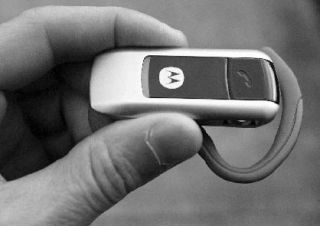New law goes into effect July 1
Washington drivers will have an excuse to go shopping for new cell-phone accessories starting July 1, when a new state traffic law makes driving with a phone to the ear illegal.
Kent Police Traffic Sgt. Rafael Padilla said he’ll be among the crowd to head to the cell-phone store.
“I have an old Bluetooth, but it doesn’t work that well,” he said. “I’m going to have to buy a new one for this.”
The officer said the hands-free cell-phone law bans motorists from driving while holding a wireless device, such as a cell phone, up to the ear. The law follows another recently passed law prohibiting sending, receiving and reading text messages on a cell phone while driving, which went into effect in January.
Unlike the text-messaging ban, drivers still are allowed to talk on cell phones while driving provided they use a hands-free device, such as a Bluetooth earpiece, wired headset or speaker phone.
Violators will face a $124 fine, Padilla said, but the law is currently classified as a secondary enforcement law. A citation will only be issued if a driver is first pulled over for another traffic violation.
“Like if you’re talking on the phone and accidentally drift into another lane,” the officer explained. “Then we would pull you over, and you’d get a unsafe lane-change violation, which is $124, as well as the cell-phone violation, which is another $124.”
He said he can also see the citation being given to drivers involved in rear-end collisions and other fender benders, found to have been talking on their cell phones before the accident.
The law is important to have in place, Padilla said. He’s seen several accidents in which talking on a cell phone played a detrimental role.
“In terms of serious collisions, there are usually several factors that contribute,” Padilla said. “I have seen cell phones be one of those factors, but there are usually a number of other factors in the really serious accidents that result in fatalities. But if we can take one of those factors out, like cell phones, maybe that accident wouldn’t occur.”
Kent Police officers have been issuing citations to cell-phone-using drivers for years, though, he said. At City of Kent ordinance prohibiting inattentive driving is already in place, and distracted driving due to cell-phone use can fall under that.
But he said having the specific text-messaging law in place for the last several months already has made a difference. He hasn’t seen many glowing screens in front of drivers’ faces lately.
“People are either not doing it or going about doing it more covertly,” he said. “Either way, it’s having an impact.”
He says legislators were reasonable in making the new traffic laws secondary offenses, but he thinks the classification might change down the road.
“They realized that we’re living in a culture where everybody talks on their cell phone,” Padilla said. “But I wouldn’t be surprised to see this go the way of the seat belt, where it becomes a primary offense.”
After July 1, drivers can only use a cell phone without a hands-free device if it is an emergency situation or if they are reporting illegal activity. The hands-free law does not apply to drivers with hearing aids. Infractions will not be placed on driving records and are not reportable to employers or insurance companies.
For more information about the hands-free law and the text-messaging ban, visit the Washington State Legislature Web site, www.leg.wa.us, and search for Senate bill 5037.
Contact Daniel Mooney at 253-437-6012 or dmooney@reporternewspapers.com.
Talk to us
Please share your story tips by emailing editor@kentreporter.com.
To share your opinion for publication, submit a letter through our website https://www.kentreporter.com/submit-letter/. Include your name, address and daytime phone number. (We’ll only publish your name and hometown.) Please keep letters to 300 words or less.

